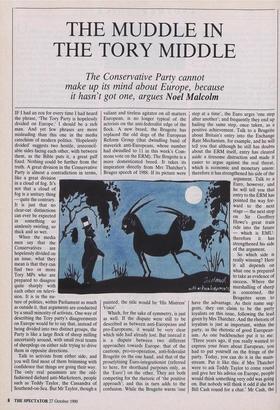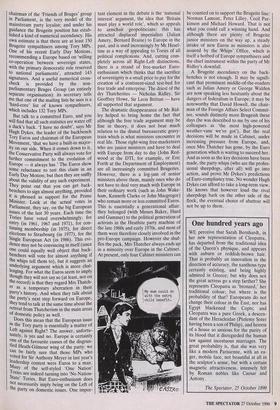THE MUDDLE IN THE TORY MIDDLE
The Conservative Party cannot make up its mind about Europe, because
it hasn't got one, argues Noel Malcolm IF I had an ecu for every time I had heard the phrase, 'The Tory Party is hopelessly divided on Europe,' I should be a rich man. And yet few phrases are more misleading than this one in the media catechism of modern politics. 'Hopelessly divided' suggests two hostile, irreconcil- able sides facing each other, with between them, as the Bible puts it, a great gulf fixed. Nothing could be further from the truth. A great division in the Conservative Party is almost a contradiction in terms, like a great division in a cloud of fog. It's not that a cloud of fog is a unitary thing — quite the contrary. It is just that no clear-cut distinctions can ever be expected in something so aimlessly swirling, so thick and so wet.
When the media men say that the Conservatives are hopelessly divided on an issue, what they mean is that they can find two or more Tory MPs who are prepared to disagree quite sharply with each other on televi- sion. It is in the na- ture of politics, within Parliament as much as outside it, that arguments are conducted by a small minority of activists. One way of describing the Tory party's disagreements on Europe would be to say that, instead of being divided into two distinct groups, the Party is like a large flock of sheep milling uncertainly around, with small rival teams of sheepdogs on either side trying to drive them in opposite directions.
Talk to activists from either side, and you will find most of them brimming with confidence that things are going their way. The only real pessimists are the old- fashioned diehard anti-Marketeers, people such as Teddy Taylor, the Cassandra of Southend-on-Sea. But Mr Taylor, though a valiant and tireless agitator on all matters European, is no longer typical of the activists on the anti-federalist edge of the flock. A new breed, the Brugeite has replaced the old dogs of the European Reform Group (that dwindling band of maverick anti-Europeans, whose number had dwindled to 11 in this week's Com- mons vote on the ERM). The Brugeite is a more domesticated breed. It takes its inspiration directly from Mrs Thatcher's Bruges speech of 1988. If its picture were painted, the title would be 'His Mistress' Voice'.
Which, for the sake of symmetry, is just as well. If the dispute were still to be described as between anti-Europeans and pro-Europeans, it would be very clear which side had already lost. But instead it is a dispute between two different approaches towards Europe: that of the cautious, pro-co-operation, anti-federalist Brugeite on the one hand, and that of the proselytising Euro-integrationist (referred to here, for shorthand purposes only, as the 'Euro') on the other. They are both competing for the rhetoric of 'the positive approach'; and this in turn adds to the confusion. While the Brugeite warns 'one So which side is really winning? Here it all depends on what one is prepared to take as evidence of success. Where the marshalling of sheep is concerned, the Brugeites seem to have the advantage. As their name sug- gests, they can claim to be the party loyalists on this issue, following the lead given by Mrs Thatcher. And the rhetoric of loyalism is just as important, within the party, as the rhetoric of good European- ism. As one backbencher put it to me: `Three years ago, if you really wanted to express your fears about European, you had to put yourself on the fringe of the party. Today, you can do it in the main- stream. Put it like this: if Mrs Thatcher were to ask Teddy Taylor to come round and give her his advice on Europe, people would think something very odd was going on. But nobody will think it odd if she has Bill Cash round for a chat.' Mr Cash, the chairman of the 'Friends of Bruges' group in Parliament, is the very model of the mainstream party loyalist; and under his guidance the Brugeite position has estab- lished a kind of numerical ascendancy. His own estimate is that there are at least 150 Brugeite sympathisers among Tory MPs. One of his recent Early Day Motions, recommending a Europe based on 'willing co-operation between sovereign states, with the primary democratic role reserved to national parliaments', attracted 143 signatures. And a useful numerical cross- check is provided by the non- parliamentary Bruges Group (an entirely separate organisation): its secretary tells me that one of the mailing lists he uses is a `hard-core' list of known sympathisers, which includes 132 Tory MPs. But talk to a committed Euro, and you will find that all such statistics are water off a duck's back. have no doubt', says Mr Hugh Dykes, the leader of the backbench Tory Euros and chairman of the European Movement, 'that we have a built-in major- ity on our side. When it comes down to it, the Conservative Party will always vote for further commitment to the evolution of Europe — it always has.' The Euros show some reluctance to test this claim in an Early Day Motion; but then they are sniffy about the validity of any such experiment. They point out that you can get back- benchers to sign almost anything, provided it is phrased as support for the Prime Minister. Look at the actual votes in Parliament, they say, on the big European issues of the last 30 years. Each time the Tories have voted overwhelmingly: for entry (in 1961, 1967 and 1971), for con- tinuing membership (in 1975), for direct elections to Strasbourg (in 1977), for the Single European Act (in 1986). This evi- dence may not be convincing in itself (since one could equally well object that back- benchers will vote for almost anything if the whips tell them to), but it suggests an underlying argument which is more chal- lenging. For what the Euros seem to imply though they will not say so (at least, not on the record) is that they regard Mrs Thatch- er as a temporary aberration in their Party's history. And when they talk about the party's next step forward on Europe, they tend to talk at the same time about the retreat from Thatcherism in the main areas of domestic policy as well. Does this mean that the European issue in the Tory party is essentially a matter of Left against Right? The answer, unfortu- nately, is yes and no. Europe is certainly one of the favourite causes of the disgrun- tled Heath-Gilmour wing of the party: we can be fairly sure that those MPs who voted for Sir Anthony Meyer in last year's leadership contest were Euros to a man. Many of the self-styled 'One Nation' Tories are indeed turning into 'No Nation- State' Tories. But Euro-enthusiasm does not necessarily imply being on the Left of the party on domestic issues. One impor- tant element in the debate is the 'national interest' argument, the idea that 'Britain must play a world role', which so appeals to armchair geopoliticians: this has attracted displaced imperialists (Julian Amery, Bernard Braine) to Europe in the past, and is used increasingly by Mr Hesel- tine as a way of appealing to Tories of all political complexions. And, cutting com- pletely across all Right-Left distinctions, there is a strand of free-market Euro- enthusiasm which thinks that the sacrifice of sovereignty is a small price to pay for the creation of a continent-sized test-bed for free trade and enterprise. The driest of the dry Thatcherites — Nicholas Ridley, Sir Geoffrey Howe, Sir Leon Brittan — have all supported that argument.
The dramatic disappearance of Mr Rid- ley helped to bring home the fact that although the free trade argument may be fine in theory, it does not bear much relation to the dismal bureaucratic gravy- train which is what ministers encounter in real life. Those right-wing free-marketeers who are junior ministers and have to deal with Europe from day to day (John Red- wood at the DTI, for example, or Eric Forth at the Department of Employment) are all increasingly committed Brugeites. However, there is a log-jam of senior ministers above them, mainly ones who do not have to deal very much with Europe in their ordinary work (such as John Wake- ham, Kenneth Clarke or John Macgregor) who remain more or less committed Euros. This is essentially a generational affair: they belonged (with Messrs Baker, Hurd and Gummer) to the political generation of activists in the Heathite party machine of the late 1960s and early 1970s, and most of them were therefore closely involved in the pro-Europe campaign. However she shuf- fles the pack, Mrs Thatcher always ends up in a minority over Europe in the Cabinet. At present, only four Cabinet ministers can be counted on to support the Brugeite line: Norman Lamont, Peter Lilley, Cecil Par- kinson and Michael Howard. That is not what you could call a winning hand. And although there are plenty of Brugeite junior ministers on the way up, a steady intake of new Euros as ministers is also assured by the Whips' Office, which is itself a hotbed of Europe sympathisers and the chief instrument within the party of Mr Ridley's downfall.
A Brugeite ascendancy on the back- benches is not enough. It may be signifi- cant that prominent middle-of-the-roaders such as Julian Amery or George Walden are now speaking less hesitantly about the dangers of federalism in Europe; it may be noteworthy that David Howell, the chair- man of the Foreign Affairs Select Commit- tee, sounds distinctly more Brugeish these days (he was described to me by one of his colleagues as 'the most high-powered weather-vane we've got'). But the real decisions will be made in Cabinet, under increasing pressure from Europe, and, once Mrs Thatcher has gone, by the Euro generation which is waiting to succeed her. And as soon as the key decisions have been made, the party whips (who are the profes- sional sheepdogs, after all) will go into action, and prove Mr Dykes's predictions of Euro-compliancy true. No wonder Hugh Dykes can afford to take a long-term view. He knows that however loud the rival sheepdogs bark on the other side of the flock, the eventual choice of abattoir will not be up to them.



































































 Previous page
Previous page